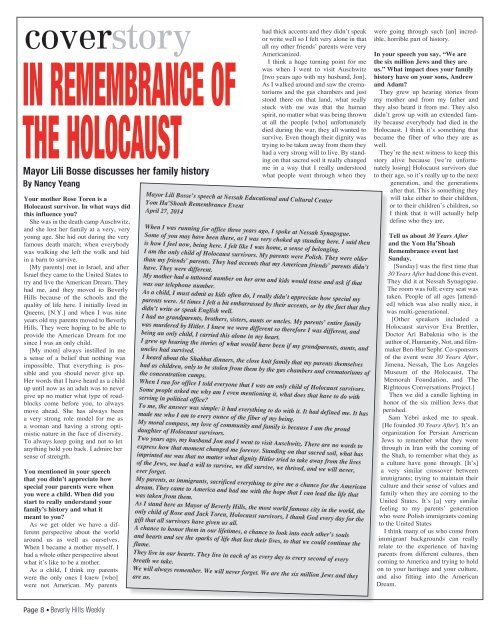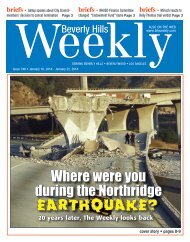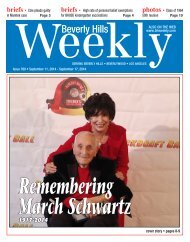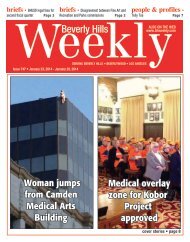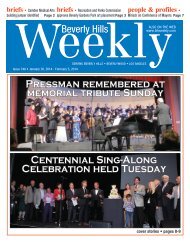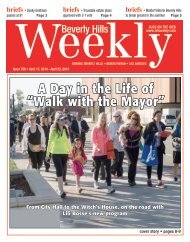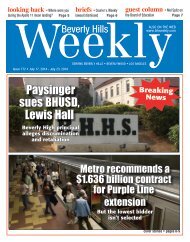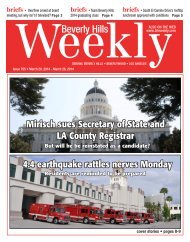1msgpqB
1msgpqB
1msgpqB
Create successful ePaper yourself
Turn your PDF publications into a flip-book with our unique Google optimized e-Paper software.
coverstory<br />
In remembrance of<br />
the Holocaust<br />
Mayor Lili Bosse discusses her family history<br />
By Nancy Yeang<br />
Your mother Rose Toren is a<br />
Holocaust survivor. In what ways did<br />
this influence you<br />
She was in the death camp Auschwitz,<br />
and she lost her family at a very, very<br />
young age. She hid out during the very<br />
famous death march; when everybody<br />
was walking she left the walk and hid<br />
in a barn to survive.<br />
[My parents] met in Israel, and after<br />
Israel they came to the United States to<br />
try and live the American Dream. They<br />
had me, and they moved to Beverly<br />
Hills because of the schools and the<br />
quality of life here. I initially lived in<br />
Queens, [N.Y.] and when I was nine<br />
years old my parents moved to Beverly<br />
Hills. They were hoping to be able to<br />
provide the American Dream for me<br />
since I was an only child.<br />
[My mom] always instilled in me<br />
a sense of a belief that nothing was<br />
impossible. That everything is possible<br />
and you should never give up.<br />
Her words that I have heard as a child<br />
up until now as an adult was to never<br />
give up no matter what type of roadblocks<br />
come before you, to always<br />
move ahead. She has always been<br />
a very strong role model for me as<br />
a woman and having a strong optimistic<br />
nature in the face of diversity.<br />
To always keep going and not to let<br />
anything hold you back. I admire her<br />
sense of strength.<br />
You mentioned in your speech<br />
that you didn’t appreciate how<br />
special your parents were when<br />
you were a child. When did you<br />
start to really understand your<br />
family’s history and what it<br />
meant to you<br />
As we get older we have a different<br />
perspective about the world<br />
around us as well as ourselves.<br />
When I became a mother myself, I<br />
had a whole other perspective about<br />
what it’s like to be a mother.<br />
As a child, I think my parents<br />
were the only ones I knew [who]<br />
were not American. My parents<br />
had thick accents and they didn’t speak<br />
or write well so I felt very alone in that<br />
all my other friends’ parents were very<br />
Americanized.<br />
I think a huge turning point for me<br />
was when I went to visit Auschwitz<br />
[two years ago with my husband, Jon].<br />
As I walked around and saw the crematoriums<br />
and the gas chambers and just<br />
stood there on that land, what really<br />
stuck with me was that the human<br />
spirit, no matter what was being thrown<br />
at all the people [who] unfortunately<br />
died during the war, they all wanted to<br />
survive. Even though their dignity was<br />
trying to be taken away from them they<br />
had a very strong will to live. By standing<br />
on that sacred soil it really changed<br />
me in a way that I really understood<br />
what people went through when they<br />
Mayor Lili Bosse’s speech at Nessah Educational and Cultural Center<br />
Yom Ha’Shoah Remembrance Event<br />
April 27, 2014<br />
When I was running for office three years ago, I spoke at Nessah Synagogue.<br />
Some of you may have been there, as I was very choked up standing here. I said then<br />
is how I feel now, being here. I felt like I was home, a sense of belonging.<br />
I am the only child of Holocaust survivors. My parents were Polish. They were older<br />
than my friends’ parents. They had accents that my American friends’ parents didn’t<br />
have. They were different.<br />
My mother had a tattooed number on her arm and kids would tease and ask if that<br />
was our telephone number.<br />
As a child, I must admit as kids often do, I really didn’t appreciate how special my<br />
parents were. At times I felt a bit embarrassed by their accents, or by the fact that they<br />
didn’t write or speak English well.<br />
I had no grandparents, brothers, sisters, aunts or uncles. My parents’ entire family<br />
was murdered by Hitler. I knew we were different so therefore I was different, and<br />
being an only child, I carried this alone in my heart.<br />
I grew up hearing the stories of what would have been if my grandparents, aunts, and<br />
uncles had survived.<br />
I heard about the Shabbat dinners, the close knit family that my parents themselves<br />
had as children, only to be stolen from them by the gas chambers and crematoriums of<br />
the concentration camps.<br />
When I ran for office I told everyone that I was an only child of Holocaust survivors.<br />
Some people asked me why am I even mentioning it, what does that have to do with<br />
serving in political office<br />
To me, the answer was simple: it had everything to do with it. It had defined me. It has<br />
made me who I am to every ounce of the fiber of my being.<br />
My moral compass, my love of community and family is because I am the proud<br />
daughter of Holocaust survivors.<br />
Two years ago, my husband Jon and I went to visit Auschwitz. There are no words to<br />
express how that moment changed me forever. Standing on that sacred soil, what has<br />
imprinted me was that no matter what dignity Hitler tried to take away from the lives<br />
of the Jews, we had a will to survive, we did survive, we thrived, and we will never,<br />
ever forget.<br />
My parents, as immigrants, sacrificed everything to give me a chance for the American<br />
dream. They came to America and had me with the hope that I can lead the life that<br />
was taken from them.<br />
As I stand here as Mayor of Beverly Hills, the most world famous city in the world, the<br />
only child of Rose and Jack Toren, Holocaust survivors, I thank God every day for the<br />
gift that all survivors have given us all.<br />
A chance to honor them in our lifetimes, a chance to look into each other’s souls<br />
and hearts and see the sparks of life that lost their lives, to that we could continue the<br />
flame.<br />
They live in our hearts. They live in each of us every day to every second of every<br />
breath we take.<br />
We will always remember. We will never forget. We are the six million Jews and they<br />
are us.<br />
were going through such [an] incredible,<br />
horrible part of history.<br />
In your speech you say, “We are<br />
the six million Jews and they are<br />
us.” What impact does your family<br />
history have on your sons, Andrew<br />
and Adam<br />
They grew up hearing stories from<br />
my mother and from my father and<br />
they also heard it from me. They also<br />
didn’t grow up with an extended family<br />
because everybody had died in the<br />
Holocaust. I think it’s something that<br />
became the fiber of who they are as<br />
well.<br />
They’re the next witness to keep this<br />
story alive because [we’re unfortunately<br />
losing] Holocaust survivors due<br />
to their age, so it’s really up to the next<br />
generation, and the generations<br />
after that. This is something they<br />
will take either to their children,<br />
or to their children’s children, so<br />
I think that it will actually help<br />
define who they are.<br />
Tell us about 30 Years After<br />
and the Yom Ha’Shoah<br />
Remembrance event last<br />
Sunday.<br />
[Sunday] was the first time that<br />
30 Years After had done this event.<br />
They did it at Nessah Synagogue.<br />
The room was full; every seat was<br />
taken. People of all ages [attended]<br />
which was also really nice, it<br />
was multi-generational.<br />
[Other speakers included a<br />
Holocaust survivor Eva Brettler,<br />
Doctor Ari Babaknia who is the<br />
author of, Humanity, Not, and filmmaker<br />
Ben-Hur Sephr. Co-sponsors<br />
of the event were 30 Years After,<br />
Jimena, Nessah, The Los Angeles<br />
Museum of the Holocaust, The<br />
Memorah Foundation, and The<br />
Righteous Conversations Project.]<br />
Then we did a candle lighting in<br />
honor of the six million Jews that<br />
perished.<br />
Sam Yebri asked me to speak.<br />
[He founded 30 Years After]. It’s an<br />
organization for Persian American<br />
Jews to remember what they went<br />
through in Iran with the coming of<br />
the Shah, to remember what they as<br />
a culture have gone through. [It’s]<br />
a very similar crossover between<br />
immigrants; trying to maintain their<br />
culture and their sense of values and<br />
family when they are coming to the<br />
United States. It’s [a] very similar<br />
feeling to my parents’ generation<br />
who were Polish immigrants coming<br />
to the United States<br />
I think many of us who come from<br />
immigrant backgrounds can really<br />
relate to the experience of having<br />
parents from different cultures, then<br />
coming to America and trying to hold<br />
on to your heritage and your culture,<br />
and also fitting into the American<br />
Dream.<br />
Page 8 • Beverly Hills Weekly


